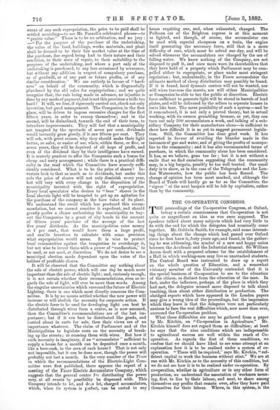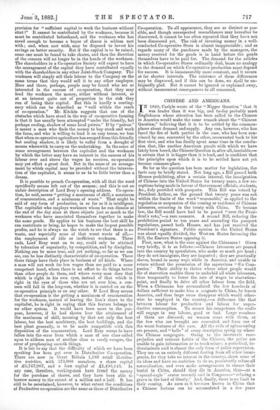THE CO-OPERATIVE CONGRESS.
THE proceedings of the Co-operative Congress, at Oxford, betray a certain consciousness that Co-operation is not quite so magnificent an idea as was once supposed. The speakers talked about many subjects which had very little to
do with the end for which the delegates had nominally come together. Mr. Goldwin Smith, for example, said some interest- ing things about the change which had passed over Oxford since he first knew it, forty years ago, and found, in the gather- ing he was addressing, the symbol of a new and happy union between the Academic and the Industrial element. Sir William Anson dealt with a proposed scheme for the establishment of a Hall in which working-men may live as unattached students. The Central Board was instructed to draw up a report on the whole question of Education, and a somewhat visionary member of the University contended that it is the special business of Co-operation to see to the education of the citizen, as distinct from the education of the man. In fact, under the influence, perhaps, of the place in which they had met, the delegates seemed more disposed to talk about teaching, than about either distribution or production. The abridged reports which have appeared in the London papers may give a wrong idea of the proceedings, but the impression which they leave is that the delegates were not particularly- anxious to face the real difficulties which, now more than ever, surround the Co-operation problem.
What these difficulties are may be gathered from a paper
by Mr. Kitchin' on " Co-operation in Agriculture." Mr. Kitchin himself does not regard them as difficulties ; at least he says that the nine conditions which are indispensable to agricultural success are well within the reach of Co- operation. As regards the first of these conditions, we confess that we should have liked to see some attempt at an explanation how it is to be realised under a system of co- operation. " There will be required," says Mr. Kitchin, " suf- ficient capital to work the business without stint." We are at
one with Mr. Kitchin as to the necessity of this condition, but we do not see how it is to be realised under co-operation. By
co-operation, whether in agriculture or in any other form of
production, we understand the association of workmen mean- ing, first, to live by their labour, and next, to share among themselves any profits that remain over, after they have paid themselves for their labour. Where, in this system, is the provision for " sufficient capital to work the business without stint ?" It cannot be contributed by the workmen, because it must be contributed beforehand, and the workman who has saved enough to become a buyer of shares is seldom met with ; and, when met with, may be disposed to invest his savings on better security. But if the capital is to be raised, some one must be found to take shares, and then the direction of the concern will no longer be in the hands of the workmen.
The shareholders in a Co-operative Society will expect to have the management of the capital they have contributed equally with the shareholders in any other Joint-Stock Company. The workmen will simply sell their labour to the Company on the same terms that they would sell it to any other employer. Here and there, perhaps, people may be found who are so interested in the success of co-operation, that they may lend the workmen the money, either without interest, or at an interest quite out of proportion to the risk they run of losing their capital. But this is hardly a conting- ency which can be described as " well within the reach of co-operation." Mr. Kitchin suggests that one of the obstacles which have stood in the way of co-operative farming is that it has usually been attempted "under the friendly, but perhaps cooling, shadow of some local patron." If by "patron" is meant a man who finds the money to buy stock and work the farm, and who is willing to lend it on easy terms, we fear that when co-operative agriculture has escaped from this friendly but cooling shadow, it is likely to suffer from a drought of means wherewith to carry on the undertaking. In the sense of some arrangement between the capitalist and the workman by which the latter may have an interest in the success of his labour over and above the wages he receives, co-operation may yet effect a great deal. But in the sense of an arrange- ment by which capital may be provided without the interven- tion of the capitalist, it seems to us to be little better than a dream.
It is possible to preach Co-operation, with all that the word specifically means left out of the sermon; and this is not an unfair description of Lord Reay's opening address. Co-opera- tion, he said, means " getting a maximum of skill, a maximum of remuneration, and a minimum of waste." That might be said of any form of production, in so far as it is intelligent.
The capitalist who employs workmen whom he can dismiss at the end of the day aims at these objects just as much as the workmen who have associated themselves together to make the same goods. He applies to his business the best skill he can contribute or bring, he hopes to make the largest possible profits, and he is always on the watch to see that there is no
waste, and especially none of that worst waste of all,—
the employment of idle or inefficient workmen. These ends, Lord Reay went on to say, could only be attained by toleration of superiority, by competition, and by discipline.
Nothing can be more true, and yet nothing, so far as we can see, can be less distinctly characteristic of co-operation. These three things have their place in business of all kinds. Where a man will not work for less wages than are paid to a more competent hand, where there is no effort to do things better than other people do them, and where every man does that which is right in his own eyes, instead of that which is right in the eyes of those who are set over him, a con- cern will fail in the long-run, whether it is carried on on the co-operative principle or on any other. If Lord Reay means that co-operation is the getting a maximum of remuneration for the workmen, instead of leaving the lion's share to the capitalist, he is right in saying that this feature belongs to no other system. It would have been more to the pur- pose, however, if he had shown how the attainment of the maximum of skill, meaning by that not only the best labour, but the best machinery, the best buildings, and the best plant generally, is to be made compatible with this disposition of the remuneration. Lord Reay seems to have fallen into the error from which a man of one class called upon to address men of another class so rarely escapes, the error of prophesying smooth things.
It is fair to say that the difficulty of which we have been speaking has been got over in Distributive Co-operation.
There are now in Great Britain 1,189 retail distribu- tive societies, with 573,000 members, a share capital of £5,747,907, and a loan capital of £1,496,143. In
any case, therefore, working-men have found the money for the purchase of shares, and they have been able to
borrow money to the extent of a million and a half. It has still to be ascertained, however, to what extent the conditions of Productive co-operation are the same as those of Distributive
Co-operation. To all appearance, they are as distinct as pos- sible, and though unsuspected resemblances may hereafter be discovered, it cannot be too often repeated that they have not been discovered yet. The risk of investing money in a well- conducted Co-operative Store is almost inappreciable ; and as regards many of the purchases made by the managers, the money received for the goods is in hand before the goods themselves have to be paid for. The demand for the articles in which Co-operative Stores ordinarily deal, bears no analogy to the demand on which Co-operative-production must depend for success. It is immeasurably more constant, and it recurs at far shorter intervals. The existence of these differences may be disproved, and if this can be done, we shall be un- feignedly glad. But it cannot be ignored or explained away,. without inconvenient consequences to all concerned.















































 Previous page
Previous page